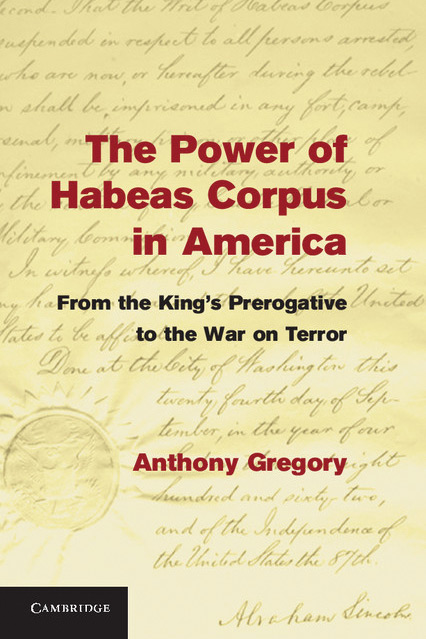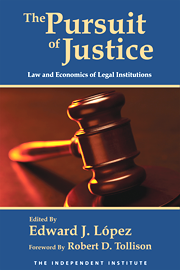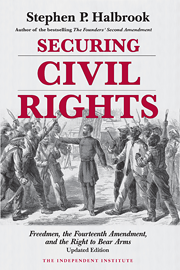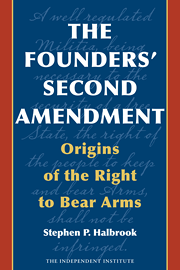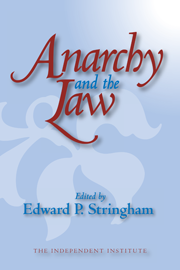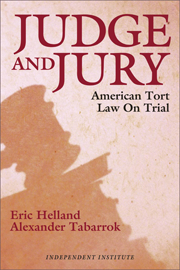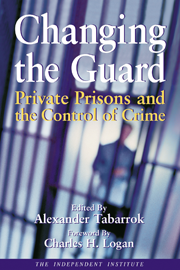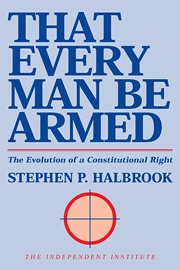| List Price: | ||
| Price: | $25.50 | |
| Discount: | $6.50 (Save 20%) |
| Formats |
Paperback (ISBN 1.318) |
Hardcover (ISBN 1.587) |
| List Price: | ||
| Price: | $25.50 | |
| Discount: | $6.50 (Save 20%) |
| Formats |
Paperback (ISBN 1.318) |
Hardcover (ISBN 1.587) |
Overview
Despite its mystique as the greatest Anglo-American legal protection, habeas corpus has a long history that features opportunistic power plays, political hypocrisy, ad hoc jurisprudence, and many failures in effectively securing individual liberty. The Power of Habeas Corpus in America tells the story of the writ from medieval England to modern America, crediting the rocky history to the writ’s very nature as a government power.
This pioneering book weighs in on habeas’s historical controversies—addressing its origins, the relationship between king and parliament, the U.S. Constitution’s Suspension Clause, the writ’s role in the power struggle between the federal government and the states, and the proper scope of federal habeas for state prisoners and for wartime detainees from the Civil War and World War II to the War on Terror.
Anthony Gregory stresses the importance of liberty and detention policy in making the writ more than a tool of power. Taken as a whole, The Power of Habeas Corpus in America presents a nuanced and critical view of the writ’s history, showing the dark side of this most revered judicial power.
Contents
Acknowledgments
Foreword by Kevin R. C. Gutzman
Introduction: The Power of the WritPart I: A History of Power Struggles
1. Common Law, Royal Courts
2. Parliament and the King
3. The Americanization of Habeas
4. Constitutional Counterrevolution
5. Fugitive Slaves and Liberty Laws
6. Suspension and Civil War
7. The Writ Reconstructed
8. Lynch Mob Justice
9. The Writ in World War
10. Federal Activism and RetreatPart II: Executive Detention in Post-9/11 America
11. Mass Roundups and Ad Hoc Secret Detentions
12. Enemy Aliens and Bush’s Prerogative
13. The Dance of the Court and the Executive
14. Obama’s Legal Black HolePart III: Custody and Liberty
15. The Great Writ’s Paradox of Power and Liberty
16. A Remedy in Search of a Principle
17. The Modern Detention State and the Future of the WritAppendices
Appendix A: Analysis of Hirabayashi v. United States
Appendix B: Analysis of Korematsu v. United States
Appendix C: Analysis of Ex Parte End
Appendix D: Analysis of Rumsfeld v. Padilla
Appendix E: Analysis of Hamdi v. Rumsfeld
Appendix F: Analysis of Rasul v. Bush
Appendix G: Analysis of Hamdan v. Rumsfeld
Appendix H: Analysis of Boumediene v. BushIndex
Detailed Summary
- Misconceptions about habeas corpus—commonly understood as the legal right not to be detained arbitrarily by the government—abound. A bumper sticker slogan critical of George W. Bush’s detention policy reflects a popular myth: “Habeas Corpus, 1215−2006.” Contrary to this view, habeas corpus did not enjoy an unbroken streak from the signing of Magna Carta until the signing of the Military Commissions Act. Moreover, habeas corpus did not originate as an individual right against unjust detention, but rather as a court’s and a king’s prerogative to challenge another party’s detention of someone. Habeas corpus as we know it today is the product of centuries of power struggles, and it continues to change as the result of pressures that affect our legal procedures and liberties.
- The paradox of habeas corpus is evident in the U.S. Constitution. Article I, Section 9, Clause 2, reads: “The Privilege of the Writ of Habeas Corpus shall not be suspended, unless when in Cases of Rebellion or Invasion the public Safety may require it.” Although we usually think of habeas corpus as a protection of an individual right against arbitrary government power, the Constitution made it the servant of the federal government, which alone decides whether an individual is engaging in unlawful rebellion or is justly acting against government abuses. This is one reason why, during debates over ratification, Anti-Federalists criticized shifting the authority to suspend habeas corpus from the states to the federal government.
- The Supreme Court decisions of the 2000s did not curtail the federal government’s detention powers as significantly as many people believe. In Boumediene v. Bush (2008), one of the most controversial decisions in its history, the Court ruled that a constitutional habeas corpus right extended to the U.S. detention camp at Guantánamo Bay and that the 2006 Military Commissions Act unconstitutionally suspended habeas corpus for alien detainees held there. It found the procedures established by the president and Congress to be an insufficient substitute for judicial process, but it left open the door for them to craft alternative detention procedures.
- President Obama’s first term yielded no real changes to the detention policies established by his predecessor—yet one more example of hypocrisy in the history of habeas corpus. Military commissions, the Guantánamo Bay detention center, indefinite detention, extraordinary renditioning, and most other manifestations of Bush’s detention policy were continued and in some cases expanded. The Obama administration’s other radical policies, such as detention at Bagram Air Force Base in Afghanistan and its assassination of American citizens, underscore the limits of habeas corpus in restraining executive power, even when the judiciary rules against it.
The right not to be arrested and jailed arbitrarily is widely viewed as central to the Anglo-American legal tradition, a pillar on which our constitutional rights rest. Leading jurists have called the protection of this right—via the legal device known as a writ of habeas corpus—“another Magna Carta” and “the most effectual protector of the liberty of the subject that any legal system has ever devised.”
Yet the Great Writ, as habeas corpus is also known, did not originate as a safeguard against unjust detention. It came to play that role after centuries of struggle among English governing bodies over who possessed the authority to detain a particular individual. Even today, in post-9/11 America, habeas corpus proceedings reflect the prominence of government power above the principle of liberty.
In The Power of Habeas Corpus in America, Anthony Gregory tells the story of the writ from medieval England to modern America, crediting the rocky history to the writ’s very nature as a government power. The book weighs in on habeas’s historical controversies—addressing its origins, the relationship between king and parliament, the U.S. Constitution’s Suspension Clause, the writ’s role in the power struggle between federal and state government, and the proper scope of federal habeas for state prisoners and wartime detainees from the Civil War and World War II to the War on Terror.
The concluding chapters stress the importance of liberty and detention policy in making the writ more than a tool of power. The book also includes appendices that examine U.S. Supreme Court decisions made during World War II and the War on Terror. Taken as a whole, The Power of Habeas Corpus in America presents a nuanced and critical view of the writ’s history, showing the dark side of this most revered judicial power.
A History of Power Struggles
Habeas corpus arose and evolved in response to struggles between competing interests. In medieval England, courts had long been decentralized and did not attempt to compel obedience. Centralized royal courts were introduced only after the Norman Conquest in 1066, and although overlapping and competing jurisdictions were common, legal procedures became more uniform. Courts issued various kinds of writs of habeas corpus to compel sheriffs, witnesses, and juries; and writs that scrutinized detentions and liberated the wrongly detained arose from higher courts asserting their authority over lower courts.
Parliament’s role is widely misunderstood. Its limiting of royal power to detain was motivated less by concerns for individual liberty than by a desire to secure its immunity against royalty and to augment its own power. On numerous occasions it dispensed with habeas corpus protections that obstructed its own agenda, and it revealed itself to be as much a menace to freedom as royalty had been.
The American colonists viewed habeas corpus as one of their common-law rights as Englishman, but they interpreted this tradition selectively. Emphasizing its purest pro-liberty element, they copied portions of England’s Habeas Corpus Act (1679) and affirmed their understanding through legal decisions and legislation, but they ignored the centralizing role that habeas had played in England.
Once the revolutionary war began, some champions of habeas discovered that it interfered with their own priorities. Virginia, for example, suspended habeas for traitors to the revolution. After independence was won, states embraced habeas in their common law, and some eventually made the writ irrevocable in their constitutions. The American understanding of habeas corpus seemed like a settled matter.
With the adoption of the federal Constitution, however, the decentralized, revolutionary conception of habeas corpus met an enormous and ultimately overwhelming challenge. The Suspension Clause transferred the ability to suspend habeas corpus from the states to the new central government. As Anti-Federalists had warned during the debates over ratification, the clause eventually transformed the American version of habeas corpus into something that resembled the British one, a writ to be imposed from above.
But even at the state level, habeas corpus was not a consistent protector of individual liberty, a fact especially evident in regard to slavery. State habeas writs were used both to undercut slavery and to defend it. In the North, habeas corpus occasionally freed slaves or blocked their return to the South. In the South, slave owners used it to bring escaped slaves back under their control, and slaves’ habeas corpus rights were subordinate to the property rights of their owners.
The Civil War revealed that the federal government was no more reliable in using the writ as a tool of freedom than were the states. The Lincoln administration suspended habeas corpus, arrested thousands of citizens in the North and South, subjected civilian detainees to military commissions, and enforced martial law. Although the dominant view until then had been that only Congress, not the president, possessed the authority to suspend habeas, Congress raised no objection when Lincoln affirmed this power as his own and even passed a law that indemnified him. The courts proved inadequate to stop the executive encroachment.
Despite Ex parte Milligan (1864), a Supreme Court decision that invalidated military tribunal convictions when civil courts were feasible, military tribunals continued well after the war. The Habeas Corpus Act of 1867 gave federal courts habeas review powers of lower and state cases—the better to protect blacks from state oppression and enforce national policy in the South. The moment that habeas corpus came into conflict with the priorities of Reconstruction, however, federal politicians worked to curb federal habeas review of federal cases.
Reconstruction brought about the full nationalization of habeas corpus. With its decision in Tarble’s Case (1871), the Supreme Court stripped the states of their authority to use habeas against federal detention.
Over the course of the following decades, law enforcement grew increasingly federalized and new threats to the liberty of detainees emerged. Prosecutions under the Chinese Exclusion Act (1882) were often challenged on habeas corpus grounds, and courts usually ruled in favor of the petitioner.
The 112,000 Japanese-Americans interned in detention camps during World War II had no such luck, and two Supreme Court decisions related to this bleak episode in habeas history are among the cases examined in detail in the book’s appendices.
After the war cases were resolved, federal habeas corpus controversies refocused on the scope of federal review of state detentions. In Ex parte Hawk (1944), the Court broadened federal scrutiny, and Congress codified this new standard in 1948. Later decisions expanded the scope of federal review, especially under the Warren Court and to a lesser degree under the Burger Court. The Rehnquist Court, however, oversaw a shift toward a narrower scope for federal review. Legislation passed in response to the Oklahoma City bombing reinforced this trend.
Executive Detention in Post-9/11 America
The executive branch’s response to the terrorist attacks on the World Trade Center and the Pentagon renewed interest in habeas corpus. Among the old issues that gained new significance were the questions of whether habeas guarantees apply to all government detainees, whether national emergencies give the executive branch special powers, and what constitutes a valid suspension of the writ.
The post-9/11 hunt for terrorists and collaborators in the United States quickly netted more than one thousand people, mostly immigrants, who were denied due process. The USA PATRIOT Act, passed in October 2001, authorized the government to detain suspected terrorists without charge for seven days—or virtually indefinitely, so long as every six months it deemed them a national security threat. Most detainees were released within one year. The treatment of American citizens John Walker Lindh, Yaser Hamdi, and Jose Padilla revealed further limitations of conventional due process procedures.
Those deemed “enemy aliens” had the fewest legal protections. Treatment included military tribunals without Geneva Convention protections, the depredations at Guantánamo Bay and Abu Ghraib, and enhanced interrogation. Dozens, and perhaps several thousands, underwent “extraordinary renditioning” to countries that practiced harsher methods of interrogation.
In 2004, 2006, and 2008, the U.S. Supreme Court issued controversial opinions that reduced executive detention power. Each decision, however, contained conciliatory elements and even guidelines on how to circumvent meaningful habeas review.
Ultimately, the Court decisions did little to weaken the authority claimed by the executive branch. President Obama, having campaigned in 2008 to close Guantánamo, gutted the impact of the Court’s rulings, both in their narrow victory for the detainees and in their broader meaning for detention policy.
Custody and Liberty
The mixed legacy of habeas corpus invites a reassessment. Scholars have long argued about what habeas corpus has “always meant,” and all sides make valid technical points. Lost in much of the discourse is the essence of the Great Writ, a meaning whose radical implications even many of its devotees have not yet considered.
Habeas has been an imperfect remedy against tyrannical imprisonment, one badly in need of a justifying principle. For those who wish for individual liberty to triumph over the abuses levied by executive detention and the modern criminal justice system, the advocacy of certain concrete reforms is necessary but hardly sufficient.
“A society needs more than the judicial order to secure its freedom,” Gregory writes. “It needs to value that freedom in itself.”
Praise
“Ask any American what his most important right is, and he is apt to mention the freedom of speech, the freedom of the press, or the freedom of religion. . . . Very rare is the person who would respond by saying, ‘The right not to be arrested and jailed arbitrarily,’ let alone mention the judicial writ that protects that right: the writ of habeas corpus. Lawyers know it as ‘the Great Writ,’ and the myth holds that its availability from time immemorial is the chief reason that Anglophones have long been free. Anthony Gregory here does the estimable service of showing that the Great Writ was not always what we now understand it to be. He also lays out in excruciating, nay shocking, detail the 150-year trend, accelerating in our day, of reducing the Writ’s importance.”
—Kevin R. C. Gutzman, Professor of History, Western Connecticut State University; author of James Madison and the Making of America
“In his insightful and timely account of habeas corpus, Anthony Gregory illuminates not only the promise, but also the limitations of what for centuries has been known as the ‘Great Writ.’ His treatment of this important subject is both eloquent and persuasive, enhancing our understanding of the relationship between law, power, and human liberty.”
—Jonathan Hafetz, Associate Professor of Law, Seton Hall University School of Law; author of Habeas Corpus After 9/11: Confronting America’s New Global Detention System
“Gregory (research fellow, Independent Institute) adds to recent studies . . . reexamining the Great Writ. Gregory emphasizes paradoxes: how a writ designed to serve liberty began as a governmental power; how a writ initially designed for individuals accused of crime is primarily sought by those who have been convicted; and how a mechanism originally used by states to question federal detentions is now almost exclusively a federal preserve. Gregory believes that those on both the Left and the Right have misused and misunderstood the writ. It has been weakened by the overzealous prosecution of enemy combatants and praised by individuals who are seeking to suspend or evade it. After detailed chapters surveying its history, Gregory concludes that the writ is not ultimately as important as the natural rights it was designed to protect. Gregory thinks the U.S. continues to incarcerate far too many people and that the writ should once again be available to state courts. Appendixes include analyses of major cases from WW II through the War on Terror. Summing Up: Recommended.”
—Choice
“Habeas Corpus is arguably the most important tool for peacefully repelling tyranny and effectively holding the government accountable for its interferences with personal freedom. It can reduce the government from a gang of armed thugs on its chosen turf to a gaggle of supplicant litigants in a neutral forum. In The Power of Habeas Corpus in America, Anthony Gregory reduces 400 years of Anglo-American legal and political history to a readable, thorough, compelling study of this natural and constitutional right. This book is so well researched and written, it will soon become the bible on all things Habeas Corpus for generations.”
—Andrew P. Napolitano, Senior Judicial Analyst, Fox News Channel
“Especially now, as individual rights are increasingly trampled with impunity by the state, Anthony Gregory’s combination of engaging historical narrative with astute legal analysis and impassioned moral advocacy provides an overview of issues surrounding the Great Writ that is simply invaluable.”
—Gary Chartier, Professor of Law and Business Ethics and Associate Dean, School of Business, La Sierra University
“Anthony Gregory ably demonstrates in The Power of Habeas Corpus in America that the Great Writ has a spotted and inconsistent history as well as a reputation for hope and freedom that does not align with stark expectations or reality. . . . At once a tool of liberation and authority, the writ of habeas corpus undermines State authority even as it validates and solidifies that authority. . . . Gregory’s book has potentially vast ramifications for all areas of libertarian jurisprudence. It is a timely corrective and an impassioned warning to libertarian lawyers, think tanks, and policy analysts who have lost their way and in the name of liberty brought us deeper into statism. . . . for the writ to be an instrument for good, society writ large needs to shift its values toward libertarianism. Of course, that solution pertains to all social problems and would remedy any number of governmental harms. Gregory may not have indicated specific alternative remedies that could replace the Great Writ, but he has shown us that received opinion about government-backed protections can impede our search for liberty.”
—The Freeman
“This tension between the ideal and the reality of habeas corpus is central to Anthony Gregory’s excellent new book, The Power of Habeas Corpus in America. Gregory, a research fellow at the Independent Institute, provides a valuable contribution to the literature on habeas corpus, one with broader implications for civil liberties, state power, and justice in a liberal democracy. The book does not attempt to capture all of the complex doctrinal shifts in habeas over the centuries. Instead, it synthesizes these developments to underscore a paradox: the way habeas serves as ‘both as an engine and a curb on state power.’ In the process, Gregory charts how power dynamics have historically shaped struggles over habeas and its role in American society. . . . Gregory is right to acknowledge habeas’ shortcomings, as Supreme Court decisions upholding the writ’s availability at Guantanamo have largely impacted detentions at the margins. He thus captures the continuing gap between the Court’s proclamations of the writ’s importance and its impact at the ground level.”
—Reason
“After 9/11, lawyers and policy makers began debating whether the standard rights of the accused, including habeas, should apply to suspected terrorists. An increasingly vocal segment of the population championed the idea that national security trumped civil liberties. Anthony Gregory, a Research Fellow at the Independent Institute, was troubled by post 9/11 detention policy — particularly the 2006 Military Commissions Act and activity at Guantanamo — so he set out to write a policy paper on habeas corpus. That paper turned into the sweeping tome, The Power of Habeas Corpus in America. The book is getting great reviews. . . . Since most of us agree that an accused person should receive some form of due process, how is it that we continue to see habeas rights erode? Gregory blames our political culture, which supports broad executive detention powers as well as an enormous domestic prison system. . . . If you . . . are ready to learn how habeas corpus is ‘simultaneously under-appreciated for its potential and over-celebrated in its actual power,’ pick up at copy of The Power of Habeas Corpus in America.”
—FindLaw U.S. Supreme Court News and Information Blog
“Among libertarians generally, there is a somewhat dependable tendency to hark back to the halcyon days of a supposed free age somewhere in the past, and to spotlight certain related features of Anglo-American legal history in service to that narrative. As those features are romanticized, they become totemic symbols of the classical-liberal tradition and its precursors, and are thus held away from criticism and analysis to a regrettable extent. In his new book, The Power of Habeas Corpus in America: From the King’s Prerogative to the War on Terror, Anthony Gregory attends to this propensity as it applies to the recondite legal doctrine of habeas corpus. . . . Throughout his book, Gregory’s review is enriched by his understanding that habeas corpus is, like most creatures of the common law, not a single, ‘clear-cut doctrine’ to be assessed as one monolithic whole. It is a swirling medley of historical, political, and legal currents that have often flowed at cross-purposes, with expediency, not principle, determining the tides. . . . The radicalized form of habeas Gregory hopes for would be a departure from historical precedent, not a continuation of it—and that is exactly the point. Because his interpretations and analyses of the historical record are radical, Gregory’s book will almost certainly bear all of the familiar cries of cynicism from all quarters of power apologists. . . . Gregory’s is a scholarly achievement, equipped even with a chart of historical terms. . . . Gregory’s book is important, then, not just for painting a more accurate picture of habeas corpus, but also for, by logical extension, disenchanting those who would see a libertarian Eden somewhere in the past. If there is something approaching a libertarian paradise to be had in the future, it cannot be a result of backward-looking invocations of a varied Anglo-American legal history; rather it will have to issue from a healthy, prudent distrust toward that past, an unflinching readiness to subject it to just the kind of trenchant scrutiny provided in The Power of Habeas Corpus in America. . . . exhaustively, expertly researched and teeming with footnotes and legal terms of art, his book does not read like a trendy member of the New York Times nonfiction bestsellers, though it is never wearisome or needlessly donnish in its air. . . . The Power of Habeas Corpus in America presents a rich reward, as comprehensive a probe into such a massive history as can be advanced in 416 pages. If this is a promise of things to come from Gregory, history lovers and libertarians are in for a treat.”
—Future of Freedom
“The Power of Habeas Corpus in America is a sophisticated biography of that most essential legal right, the ‘negative liberty’ not to be arbitrarily imprisoned by the state. . . . But despite the central importance of habeas in Anglo-American law and legal folklore, Gregory’s study is anything but a soaring law-school graduation speech about the majestic triumph of legal principle. Instead, Gregory’s account of the ‘Great Writ’ reveals its history is ‘characterized by politicization, unfulfilled promises, legal technicalities, power struggles and hypocrisy, as much as a story of liberation and justice.’ . . . Gregory’s story, like almost any other legal history of the United States, features the ongoing struggle between states’ rights and the authority of central government as a major theme. Yet although states’ rights have often been a legalistic fig leaf for Jim Crow, Gregory shows that local legal autonomy has at times stood against white supremacy. . . . Gregory’s book is appended with incisively detailed legal-political analyses of landmark habeas cases, from Korematsu, which gave the all-clear to wartime internment of Japanese-Americans, to more recent cases in our Global War on Terror. . . . Gregory blisteringly notes that ‘the U.S. criminal justice has become a system of slavery, rape and torture,’ and he urges the expansion of habeas review—which has been whittled away since the Rehnquist court to a vestigial nub—for federal prisoners. . . . Anthony Gregory has written a book that is both fiery and cool-headed, and he is an excellent guide to the circuitous and bumpy ride that is the history of the Great Writ.”
—American Conservative
“The Power of Habeas Corpus in America is a monument to meticulous research. . . . One gets the impression the author was so much immersed in his material that he couldn’t leave it even after three hundred pages. . . . [I]t is hard to miss Gregory’s main point, which is made with particular force. . . . Gregory provides testimony to the value of the writ, which was clearly established in Common Law and then brought to the infant American Republic by its constitutional architects who had been schooled in British law. It is prominently on display, or so it would seem, in the Constitution’s Article One, Section 9, and Clause 2. There, as every college student in constitutional law finds out, the principle of the writ of habeas corpus shall not be suspended, unless when in cases of rebellion or invasion the public safety may require it. . . . Despite its place in the Constitution and its earlier appearance in Common Law, habeas corpus, as Gregory proves, has just as often advanced the power of the state as protected the individual against arbitrary arrest and incarceration.”
—Libertarian Papers
Awards
2014 Independent Publisher Book Awards (“IPPY” Awards)
- Silver Winner in Current Events (Political/Economic/Legal/Media)
2013 PROSE Awards (Awarded by the Association of American Publishers)
- Best Book in Law & Legal Studies

